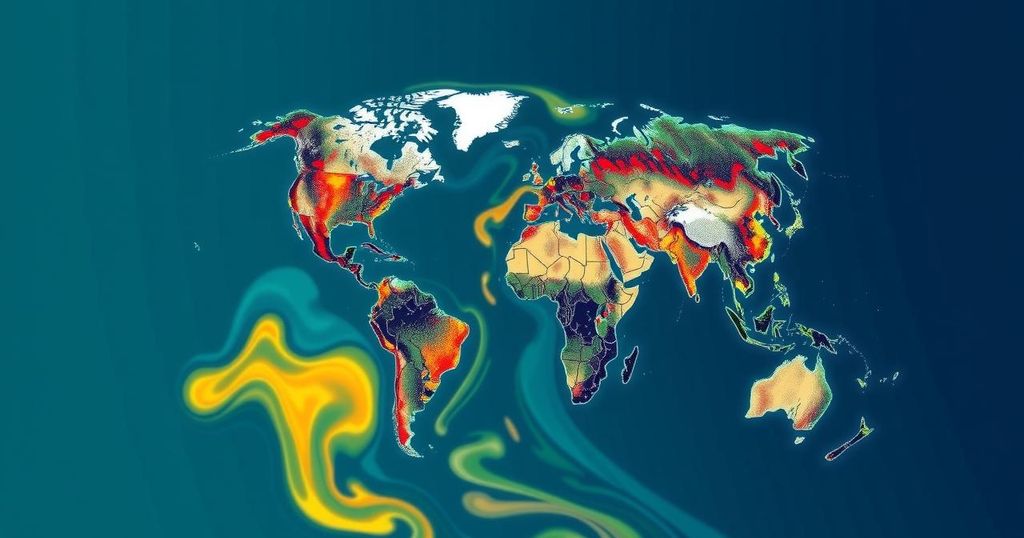ACM Gordon Bell Prize Awarded for Innovative Climate Modelling Techniques

A team has received the ACM Gordon Bell Prize for creating an advanced climate emulator, enabling high-resolution climate modeling while reducing storage needs significantly. Their work addresses urgent climate change challenges through innovative computational advancements, highlighting the role of exascale computing.
The ACM Gordon Bell Prize for Climate Modelling has been awarded to a twelve-member team for their innovative project entitled “Boosting Earth System Model Outputs And Saving PetaBytes in Their Storage Using Exascale Climate Emulators.” This prize acknowledges significant advancements in parallel computing that contribute to addressing the global climate crisis. The team consists of experts from prestigious institutions, including King Abdullah University of Science and Technology, the National Center for Atmospheric Research, and NVIDIA, among others.
Climate change, predominantly driven by human activities such as fossil fuel usage, has reached alarming levels, with increasing occurrences of extreme weather events and biodiversity loss. Recognizing this, the scientific community utilizes computational tools to enhance understanding and strategize responses to climate challenges. Recent advancements in exascale supercomputers, capable of performing quintillions of calculations per second, have significantly improved climate modeling accuracy.
The prize-winning team’s approach involves the development of an exascale climate emulator designed to mitigate the considerable computational and storage demands of high-resolution Earth System Model simulations. Emulators enhance the functionality and efficiency of computational models by allowing networks of computers to work collaboratively. This technology plays a crucial role in easing the burden associated with climate modeling, thus facilitating advanced climate modeling capabilities.
This emulator could potentially save vast amounts of data storage, equivalent to the capacity of approximately 170 high-end servers. The model developed boasts an unprecedented resolution, with over 54 million spatial data points and extensive hourly and daily climate observations, achieved through state-of-the-art high-performance computing techniques. The team successfully employed mixed-precision computations across multiple supercomputers to achieve these results, demonstrating their emulator’s practicality and efficiency.
Their findings suggest that the exascale climate emulator holds great promise for advancing climate research and the development of machine learning and AI methodologies for climate forecasting. The award presentation took place during the International Conference for High-Performance Computing, Networking, Storage, and Analysis in Atlanta, Georgia, from November 17 to 22.
The ACM, known for its dedication to the computing profession, aims to encourage innovation in computational methods for climate science through the Gordon Bell Prize, which includes a monetary award and publication opportunities in significant research journals.
This award recognizes significant strides in combatting climate change through advanced computational techniques that enhance understanding and responsiveness to this global crisis.
The increasing severity of climate change, attributed largely to human activities, necessitates advanced computational techniques to predict and understand its implications effectively. Parallel computing and high-performance computing models have emerged to address the data-intensive nature of climate simulation, offering innovative solutions to the growing problem of climate modeling accuracy and efficiency. The use of exascale computing allows for unprecedented levels of processing power to address these challenges, making significant advancements possible in climate science and policy formulation.
The ACM Gordon Bell Prize for Climate Modelling underscores the critical role of advanced computing in tackling climate change. The prize-winning team’s development of an exascale climate emulator represents a significant innovation that could transform climate modeling practices, enabling researchers to utilize high-resolution data more effectively while conserving computational resources. This achievement not only enhances our understanding of climate dynamics but also paves the way for integration with machine learning and AI in climate prediction and research.
Original Source: www.eurekalert.org






